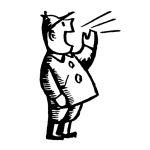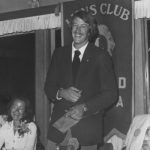 Anna Ancheta teaches voice and how to project when singing, yet her own voice is quiet. Her accomplishments as a musician, conductor, educator and multi-discipline artist and intellect are stellar, and yet Ancheta is modest. Her contributions to community life, both in Idyllwild and in the Hemet/San Jacinto Valley, create civilizing influences that make a difference, and yet few are aware of the extent of her contributions.
Anna Ancheta teaches voice and how to project when singing, yet her own voice is quiet. Her accomplishments as a musician, conductor, educator and multi-discipline artist and intellect are stellar, and yet Ancheta is modest. Her contributions to community life, both in Idyllwild and in the Hemet/San Jacinto Valley, create civilizing influences that make a difference, and yet few are aware of the extent of her contributions.
Known locally as the conductor and arranger for the female a cappella group Local Color, Ancheta also heads a nonprofit, Musica, that provides music training and orchestral experience for young and old, in Idyllwild and in Hemet/San Jacinto. Musica offers string classes and orchestral experience with the Inland Valley Youth Orchestra. It also provides master classes and mentoring to young musicians.
“Making music together serves to enrich our community and the world,” said Ancheta. “It helps to maintain community health and pride and aligns diverse ages, language groups, and cultural and racial groups. These are qualities sorely needed in communities which are stressed economically and where youth are at risk for drugs, teen pregnancy and gang involvement.”
Ancheta holds a bachelor of arts degree from U.C. Davis in history and fine arts and a master’s degree in conducting from the University of Southern California. She taught for many years at the Westridge School in Pasadena and Little Lake School in Hemet and then as part of the San Jacinto Unified School District. While there, she started a string program that remains in place today. She received awards as teacher of the year in both the Hemet and San Jacinto districts and was honored by the Soroptimists with the club’s “Ruby” award for enhancing the lives of women in her community.
When she speaks about how people learn, finding a “portal” into each person to create a trusting bridge for learning, she shows both her passion for education and her belief in the arts as the consummate civilizing influence. “Whether with old or young, I am fascinated by how people learn,” she enthused. “I’ve always believed in experiential learning, kinesthetic hands-on learning. My father was a carver who made things. My mother was a seamstress who made things. I believe the best learning has a muscle component, a component of doing, of practice. Also, my Zen Buddhist practice has influenced how I teach. Thinking about something is just that. It is important to be.”
Ancheta explains how effective it is to use the body to find the instrument within, to connect and find or reclaim one’s own voice — that effective teaching is all about finding a portal in that suits the person. She notes it’s different with young people than with those who are older. “Kids now have lost that safety zone of making communal music, of just trying stuff,” she said. “With teaching, one has to create a safety zone where it is OK to make mistakes. I often talk to parents about the importance of finding a safety haven or sanctuary for children so that they can learn not to judge themselves.” She notes that 40 years of teaching have equipped her with a large kit of instructional tools that help find that entry portal for young people.
“Older people have their own set of experiences, and so my job is to really listen and find out who they are and how I can best communicate,” she said. “It is a more creative challenge.”
It is clear, after talking with Ancheta, that these challenges, whether with old or young, are what excite and sustain her. “We make mistakes so we can learn,” she notes. “We make mistakes, practice, then deconstruct and then go back and reconstruct.” And with that, Ancheta provides a guide and model for lifelong experiential learning.
For more information about Musica and Ancheta, see www.makingmusica.org.










